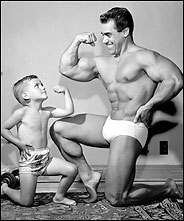The Privilege of Being a Man
The Catholic Church makes men . . . Of such she may also someday make soldiers. — Hilaire Belloc
By
Mitchell Kalpakgian ...
...
A man discovers a great cause, feels moved by a noble ideal, falls in love, or desires a great good that appeals to him. St. Benedict acts and founds his illustrious, enduring rule and monastic order that preserved Western civilization; he takes the first step that begins a chain of events that God and nature assist as a small mustard seed grows into a great plant.
...
A second privilege of being a man is a physical and mental strength to accomplish difficult things and to endure heavy crosses that demand patience, perseverance, and endurance. Yes, there are weak, ignoble, and cowardly men, but that is not the true mark of masculinity. Strong men depend on themselves — on their own will power and hard work, on their intelligence and resourcefulness, and on their self-reliance and imagination to manage their affairs or to carry the burdens and responsibilities of others who need their protection.
...
Strong men do not beg for slaves to do their work or whine about doing their duty. They value the privilege to serve women and children and others who depend upon them.
...
Men possess an enormous sense of humor, laugh easily at themselves and at the folly of others, and enjoy teasing and being teased with a light touch.... What great comedians and wits we have in witty men like Chaucer, Shakespeare, Dr. Johnson, and G.K. Chesterton! Chaucer is unafraid of ridiculing hypocritical, avaricious and lustful priests. In "The General Prologue" he satirizes the friar: "He knew the taverns well in every town, and cared more for every innkeeper and barmaid than for a leper or a beggar." Shakespeare mocks silly conventions like courtly love and grimly grave characters like Malvolio ("Dost thou think, because thou art virtuous, there shall be no more cakes and ale?"). Dr. Johnson unmasks pretentious language and exaggeration he calls "cant." In response to David Hume and Samuel Foote who boasted they were not afraid of death, Johnson remarked, "it is not true, Sir. Hold a pistol to Foote's breast, or to Hume's breast, and threaten to kill them, and you'll see how they behave." Chesterton makes the famous remark that "Angels can fly because they can take themselves lightly."
You can read the rest
here.
...

<< Home